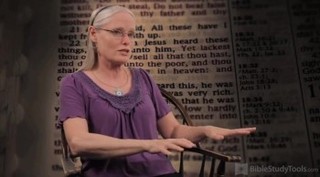
- Recent Translations
- All Translations
Videos for Esther 1:6

Esther 1:6 Meaning and Commentary
Where were white, green, and blue hangings
Or curtains of fine linen, as the Targum, which were of these several colours; the first letter of the word for "white" is larger than usual, to denote the exceeding whiteness of them. The next word is "carpas", which Ben Melech observes is a dyed colour, said to be green. Pausanias F17 makes mention of Carpasian linen, and which may be here meant; the last word used signifies blue, sky coloured, or hyacinth:
fastened with cords of fine linen and purple to silver rings, and
pillars of marble;
these pillars are said, in the Targum, to be of divers colours, red, green, and shining yellow and white, on which the silver rings were fixed, and into them were put linen strings of purple colour, which fastened the hangings to them, and so made an enclosure, within which the guests sat at the feast:
the beds were of gold and silver;
the couches on which they sat, or rather reclined at eating, as was the manner of the eastern nations; these, according to the Targum, were of lambs' wool, the finest, and the softest, and the posts of them were of gold, and their feet of silver. Such luxury obtained among the Romans in later times F18:
these were placed in a pavement of red, and blue, and white, and black,
marble;
which, according to some, are the porphyrite, Parian, alabaster, and marble of various colours; the marble of the Persians is of four colours, white, black, red and black, and white and black F19; but others take them to be precious stones, as Jarchi and Aben Ezra; the first is by the Targum interpreted crystal, by others the emerald, one of which Theophrastus F20 speaks of as four cubits long, and three broad, which might be laid in a pavement; the third is, by Bochart F21, supposed to be the pearl; and in the Talmud F23 it is said to be of such a nature, that if placed in the middle of a dining room, will give light in it as at noonday, which seems to be what is called lychnites; to which Lucian F24 ascribes a like property: nor need all this seem strange, since great was the luxury of the eastern nations. Philostratus F25 speaks of a temple in India paved with pearls, and which he says all the Barbarians use in their temples; particularly it is said F26, that the roofs of the palaces of Shushan and Ecbatana, the palaces of the kings of Persia, shone with gold and silver, ivory, and amber; no wonder then that their pavements were of very valuable and precious stones: and from hence it appears, that the "lithostrata", the word here used by the Septuagint, or tesserated pavements, were in use four hundred years before the times of Sylla, where the beginning of them is placed by Pliny F1; there was a "lithostraton" in the second temple at Jerusalem, by us rendered the pavement, ( John 19:13 ) , perhaps the same with the room Gazith, so called from its being laid with hewn stone. Aristeas F2, who lived in the times of Ptolemy Philadelphus, testifies that the whole floor of the temple was a "lithostraton", or was paved with stone: it is most likely therefore that these had their original in the eastern country, and not in Greece, as Pliny F3 supposed.
F17 Attica, sive, l. 1. p. 48.
F18 Plin. Nat. Hist. l. 33. c. 11. Sueton. Vit. Caesar. c. 49.
F19 Universal History, vol. 5. p. 87.
F20 Apud Plin. l. 37. c. 5.
F21 Hierozoic. par. 2. l. 5. c. 8.
F23 T. Bab. Megillah, fol. 12. 1.
F24 De Dea Syria.
F25 Vit. Apollon. l. 2. c. 11.
F26 Aristot. de Mundo, c. 6. Apuleius de Mundo.
F1 Nat. Hist. l. 36. c. 25.
F2 De 70 Interpret. p. 32.
F3 Ut supra. (Nat. Hist. l. 36. c. 25.)